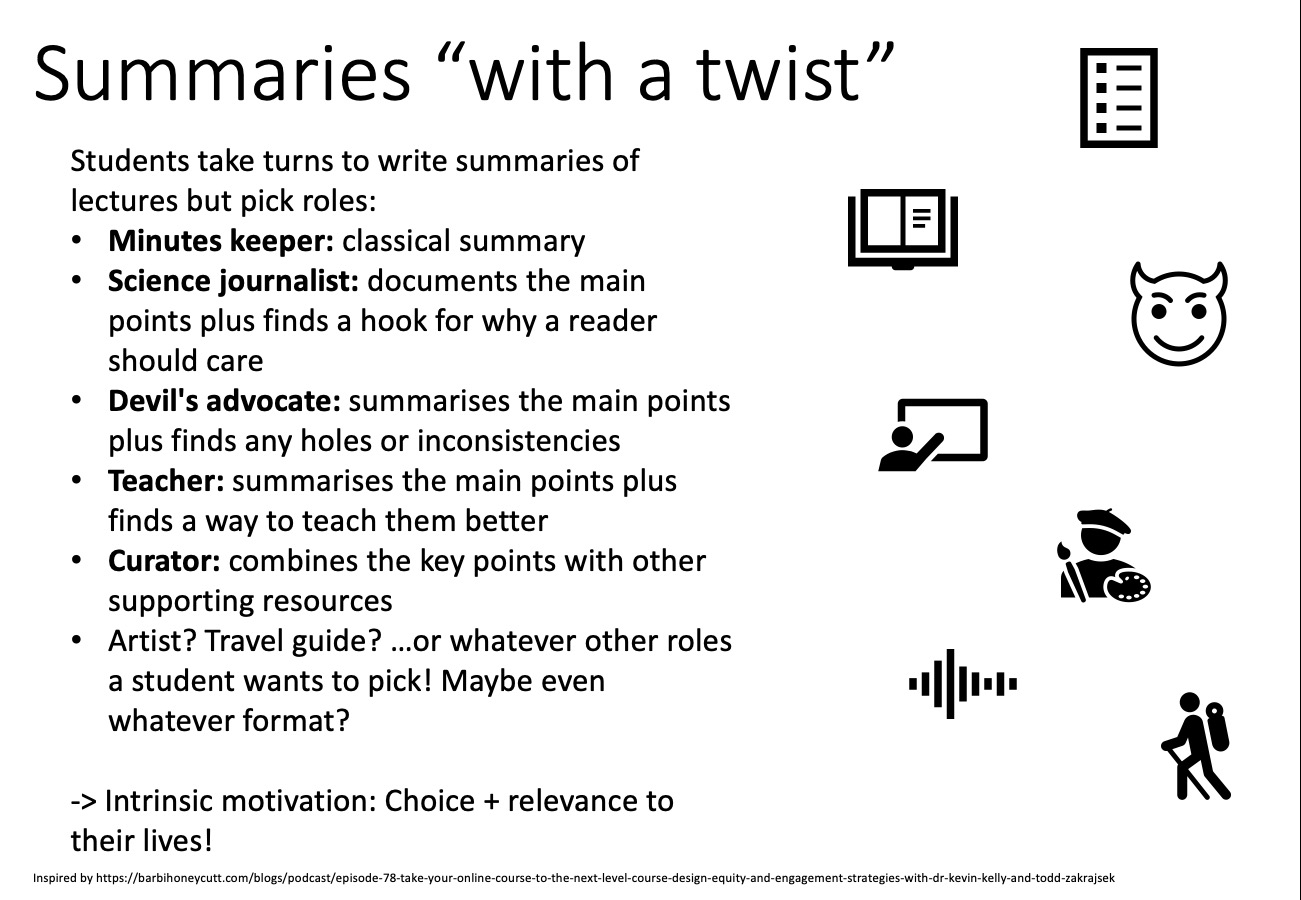
Pick a role and write a lecture summary from that perspective. Does that sound motivating?
Kjersti and I have been talking about asking students to take turns and write summaries of lectures throughout the whole semester. We would then give feedback on them to make sure we get a final result that is correct (and that the student learns something, obviously). The summaries are then collected into a booklet that students can use to study for the exam. I did that when I was teaching the “introduction to oceanography” 10 years ago and liked it (also great feedback for me on what students thought was important!), but in the end it is just one more thing we are “asking” the students to do, so is it really such a good idea?
Then on my lunchtime walk today, I listened to “lecture breakers” episode 78. Great episode as always! Early in the podcast several design criteria are mentioned, for example for intrinsic motivation it’s important to give students choice and show the relevance of what they are doing to their real life (more on the self-determination theory here), and that from an equity perspective, it’s important to provide different perspectives on a topic. Those stuck with me, and then one piece of advice was given: to let students adopt roles. Generic roles like a facilitator, researcher, devils advocate; or roles that are specific to the topic of discussion. They did not really elaborate on it very much, but what happened in my head is this: What if we combined our summaries with the idea of students choosing roles?
There are so many stakeholders in science, and students might have preferred approaches or might want to try on potential future roles. For example, someone could choose to take on the role of a minutes keeper and write a classical summary of the main points of a lecture. That would be all I asked my students to do back in the day, so not super exciting, but maybe it is what someone would choose? Or someone might choose to be a science journalist that does not only document the main points, but additionally finds a hook for why a reader should care, so for example relating it to recent local events. Or someone could pick the role of devil’s advocate and summarise the main points but also try to find any gaps or inconsistencies in the story line. Or someone might want to be a teacher and not only summarise the main points, but also find a way to teach them better than the lecturer did (or possibly to a different audience). Or someone might want to be a curator and combine the key points of the lecture with other supporting resources. Or an artist, or a travel guide, …? Or, of course, there are specific roles depending on the topic: A fisherman? Someone living in a region affected by some event? A policy maker? A concerned citizen?
Choosing such a role might give students permission to get creative. A summary does not necessarily be a written piece, it could also be a short podcast or a piece of art, if they so choose. That would definitely make it a lot more fun for everybody, wouldn’t it? No idea if students would like this new format, but it’s definitely something that I want to bring up in discussions, and — if they think it’s a good idea — also give a try some time soon!
Thinking about "Universal Design for Learning" - Adventures in Oceanography and Teaching says:
[…] Sparking student interest in the beginning is not enough, students need to stay engaged in the long run. For this, many of the same strategies work that sparked their interest in the first place, except we just keep enquiring about what students find interesting, how things relate to their lives, let them include missing perspectives. And we can offer different roles that people can take on, so they can experiment with different identities or pick the one that resonates with them the most (“battle of theories“, “writing summaries from different perspectives“). […]
Podcasts on learning and teaching, career development, and mental health in academia - Adventures in Oceanography and Teaching says:
[…] teaching practice, for example great ideas for reflection prompts (My take on this here: “take on a role and write a summary from that perspective“), or creative ways to end the semester, or sooo many more! There are, in fact, so many cool […]
Co-creating learning and teaching (Bovill, 2020) - Adventures in Oceanography and Teaching says:
[…] Asking students to write lecture summaries from the viewpoint of a chosen role […]
#Methods2Go: Transferring theoretical ideas into actionable knowledge in university teaching - Adventures in Oceanography and Teaching says:
[…] What I like about the method: That there are valid roles for the students who aren’t actively “batteling” so they are actively included in what’s going on. Even better if they can choose the roles they are taking on. […]